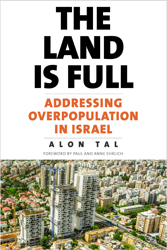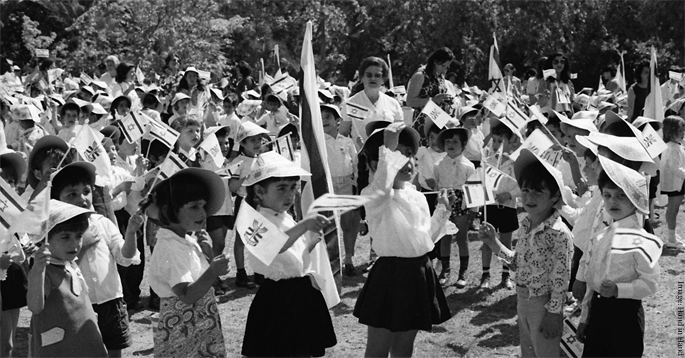Founding directory of the Israel Union for Environmental Defense Alon Tal’s latest book, The Land Is Full, addresses the problems of overpopulation in Israel. He is guest blogging here all week as part of the Visiting Scribe series on The ProsenPeople.
There was a time when expanding the number of Israeli citizens was a critical national challenge. With less than a million people, a sparsely populated Third Jewish Commonwealth was vulnerable: economically, diplomatically and militarily. As we consider the Israel’s future today, however, it needs to be clear that those days are long over. The paramount domestic policy objective for a country with over eight million citizens in 2016 involves demographic stabilization.
Today, Israel is among the most crowded nations in the world, and it continues to experience demographic growth that is unrivaled in the West. Based on present trends, Israel’s population is expected to double within the next thirty years and reach 15 million people. At that point, Israel will be the most crowded developed country in the world. But the projected factory farm densities will not make life better. Meteoric increases in population size have profound implications on the quality of life in Israel, affecting all segments of society and our collective future.
 Environmentally, the phenomena are self-evident. Israeli leaders promised to reduce greenhouse gas emissions “per capita” at the UN Paris summit, knowing full well that a 2% annual growth in population means that overall emissions are going to increase for the foreseeable future; the Dead Sea retreats into oblivion, deprived of its natural Jordan River waters which are tapped to provide water to Israel’s agriculture — even though Israeli farmers at best can only provide 45% of this expanded populace’s calories; the steady collapse of the country’s biodiversity 0151 the magnificent array of animals and plants — will continue as open spaces and habitat give way to the 60,000 housing units required every year to meet the growing demand. This tragedy may be the most irreversible part of Israel’s present ecological disaster.
Environmentally, the phenomena are self-evident. Israeli leaders promised to reduce greenhouse gas emissions “per capita” at the UN Paris summit, knowing full well that a 2% annual growth in population means that overall emissions are going to increase for the foreseeable future; the Dead Sea retreats into oblivion, deprived of its natural Jordan River waters which are tapped to provide water to Israel’s agriculture — even though Israeli farmers at best can only provide 45% of this expanded populace’s calories; the steady collapse of the country’s biodiversity 0151 the magnificent array of animals and plants — will continue as open spaces and habitat give way to the 60,000 housing units required every year to meet the growing demand. This tragedy may be the most irreversible part of Israel’s present ecological disaster.
The social dynamics are much the same. Gridlock on Israel’s roads is becoming unbearable, but the Ministry of Transportation sees no relief in sight. It predicts that within the next decade as the fleet expands, Israelis will spend an additional 50 minutes per day in their cars sitting in traffic jams. The courts are backlogged as cases wait longer and longer for judges to become available. Israel has the most crowded kindergartens in the Organisation for Economic Co-operation and Development (OECD) and among the most crowded schools. We simply cannot expand infrastructure fast enough. The hospitals are the most crowded in the OECD as well. The housing crisis will never be solved solely by increasing supply; without stabilizing demand, most young Israelis will never be able to realize the dream of owning their own home.
Worst of all, because the high birth rates are largely found among Israel’s poorest population groups, the disgraceful gaps in income in the country continue to grow worse. Equality of opportunity, a central tenet of Israeli solidarity, becomes lip service when one of every three children lives below the poverty line. Indeed, a report this year confirms that Israel’s income gaps may be the worst in the developed world. But invariably, poverty is found among families with five or more children, where resources and parental attention will never be sufficient to allow these children to compete.
The population crisis is the result of public policies which provide powerful economic incentives to have children, especially for families with low incomes. It is the result of policies that create obstacles to abortion and contraception and do not insist on empowering women and granting them equal rights and “reproductive autonomy.” We can change these policies. Indeed we must.
That’s why I wrote The Land is Full: Addressing Overpopulation in Israel. As an Israeli environmentalist, I realized the futility of spending growth all my time and energy on symptoms. Anyone concerned about ensuring a healthy, environmentally strong and equitable third Jewish Commonwealth should consider Israel’s demographic dynamics. We must all ask hard questions if we care about Israel’s future: How many people do we want to live in our “New Jersey-sized” Jewish state? How can we ensure that all Israeli women, including Arabs and Haredis, be given a chance to realize their potential academically and join Israel’s workforce? How can we change Israel’s cultural fixation on having large families? Can Jewish tradition support a new view about sustainable population size? There are answers to all of these questions. But first we need to understand that our generation’s challenge is to create a society which focuses on quality of life rather than quantity of lives.
Ben Gurion University professor Alon Tal was founding director of the Israel Union for Environmental Defense, Israel’s preeminent ecological advocacy organization, and the Arava Institute for Environmental Studies, a Middle Eastern academic program. A member of the JNF-KKL board for over a decade, from 2010 to 2013 he chaired Israel’s Green Party.
Related Content:
- Yuval Elizur: Follow the Talmud or a Jewish Sharia?
- Elana Maryles Sztokman: 7 Places Where Religious Radicalism Threatens Women’s Well-Being in Israel
- Essays on Israel
Ben Gurion University professor Alon Tal was founding director of the Israel Union for Environmental Defense, Israel’s preeminent ecological advocacy organization, and the Arava Institute for Environmental Studies, a Middle Eastern academic program. A member of the JNF-KKL board for over a decade, from 2010 to 2013 he chaired Israel’s Green Party. Haaretz has called him “Israel’s most effective environmental leader.”




